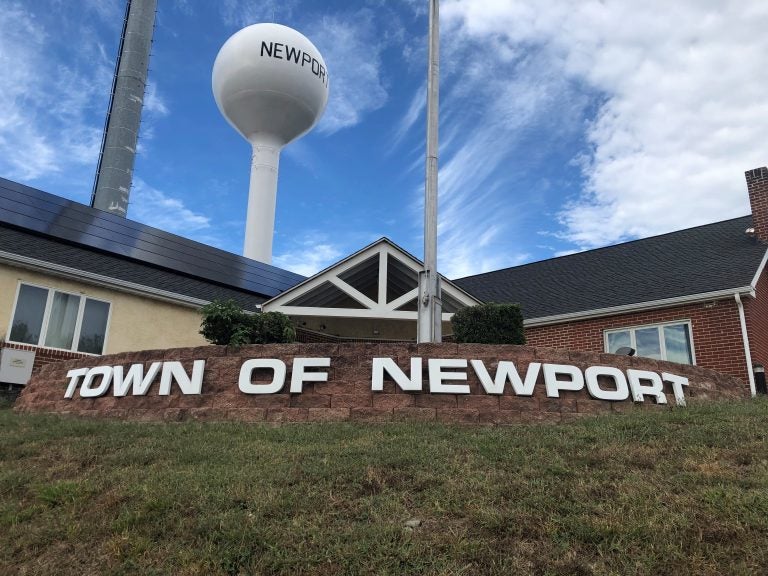Delaware town diverts money meant for crime victims to pay other bills
Newport has long been known as a “speed trap’ for aggressive traffic enforcement. The town has been flouting a state law that earmarks money from fines for crime victims.
Listen 1:04
The town of Newport, Delaware. (Cris Barrish/WHYY)
Newport, Del. is a tiny crossroads town three miles south of Wilmington that’s known by many as a “speed trap” because of its aggressive traffic enforcement by police.
Fines, court costs and fees accounted for nearly 40 percent of the town’s approved budget of $1.7 million for 2018. More than half of the budget paid salaries and benefits for the seven town cops who write those tickets and provide protection for the 1,000 residents.
But a WHYY investigation found that for all the revenue the town raises by ticketing motorists, for at least 14 years Newport hasn’t always followed a state law that requires a portion of collected fines to be paid to the state to reimburse crime victims.
Newport has been spending a portion of that money on town expenses instead of sending it to the Victims’ Compensation Fund, which pays for medical treatment, lost wages, damaged property, counseling fees, funeral expenses and other costs. The total amount diverted from the state has often been more than $100,000 and the town manager estimated it was nearly $200,000 about four years ago.
The money Newport has been misusing comes from an 18 percent surcharge added to the cost of fines for traffic and criminal offenses statewide.
Earlier this year, the town owed the state a total of $118,000 and Newport had not made any payments in more than three years, state and town records show. But after the state discovered Newport’s failure to pay, officials notified town manager Wendy King.
“Of course it is my intention to catch up, but I am always robbing Peter to pay Paul – not an excuse, just being truthful,” King wrote to Julia McCough of the Victims’ Compensation Assistance Program on May 31.
Since Sept. 9, two payments have been made, reducing the debt to about $73,000, King told WHYY. The state wants monthly payments going forward from current fines while Newport tries to erase the debt.
The victims’ program discovered Newport’s failure to make payments for three years while conducting an internal financial review, according to Mat Marshall, spokesman for Attorney General Kathy Jennings. The program is part of Jennings’ office.
Marshall said the financial review did not find any missed payments by state courts in Delaware. Those payments come from automatic deductions from each court’s bank account. But Newport has its own court system — like a handful of other Delaware towns such as Newark, Rehoboth Beach and Laurel — and pays by check.
Marshall stressed that Newport, like all other Delaware municipal and state courts, must meet its legal obligation to pay the money to the fund for crime victims instead of using them for town expenses.
“The hope and expectation is that Newport will continue to pay what is owed by law until their arrears are satisfied and we will continue working to ensure that their obligation is met,” Marshall said.
‘They rob Peter to pay Paul’
WHYY learned Oct. 7 from a source familiar with Newport finances and operations that the town had long misused some of the money owed to the victims’ fund.
The diversion of money meant for crime victims to town expenses has been a practice in Newport since at least January 2005, according to records provided by town manager King in response to WHYY’s request for information.
King told WHYY this week in an email that state officials have long been aware that Newport was diverting the money to cover other costs of running the town. “In 2010/2011, I was in touch with” an official from the victims’ fund whose name she does not recall, “and started attempting to catch up’’ on payments, King wrote.
Jennings, who took office in January, would not agree to an interview and neither would program officials, including executive director Paige Schmittinger.
But Marshall, speaking for the agency, said he could only provide information found in the recent financial review – and didn’t know about the town’s history of not making full payments. Another agency spokesman, Carl Kanefsky, said Tuesday that because of staff turnover over the last several years, “we would not want to categorically rule out some knowledge of missed payments.”
Marshall stressed that the program is solvent, and had $3.2 million in the bank when the fiscal year ended June 30, Marshall said. During fiscal 2019 the state paid $2.3 million to victims and had $650,000 in administrative costs.
WHYY has requested a full accounting of all payments made into the crime victims’ fund in recent years. Marshall said officials would provide the information and soon as possible as it’s compiled.
One leading state advocate for crime victims, Nancy McGee of Sexual Assault Network of Delaware, said the fund is critical for rape survivors because it pays for physical examinations and other medical and personal expenses.
McGee said Newport’s failure to pay money it receives to assist crime victims in its town and across Delaware opens up Newport’s finances to further scrutiny.
“They are mismanaging money. As they are saying, they rob Peter to Paul,’’ McGee said.
“They are not paying their bills and now they are caught at it. So as we used to say in school, if you are not managing your money, somebody’s going to manage it for you. Somebody’s going to manage their budget for them in Newport and other stuff is going to come to light about that.”
Money for victims used for town expenses since at least 2005
King became a town bookkeeper in April 2008 after her predecessor, Cynthia Reynolds, was arrested for embezzling more than $128,000. Reynolds later pleaded guilty to theft and official misconduct and received five years’ probation. Reynolds later repaid the town, King said.
She was promoted to town manager in January 2009. Since then her salary has increased from about $60,000 to $91,000, she said.
Newport had already been in arrears for at least three years when she became a town employee, King said. But she acknowledged that it grew under her watch as money from the 18 percent surcharge was used to pay other town salaries and bills.
King provided a list of payments to the victims’ fund that showed the town was $29,500 behind in January 2005, but by September 2008 the unpaid amount grew to $71,700.
However, she did not provide records of payments from September 2008 to April 2011, citing a lack of time to respond to WHYY’s request for payments, which was made Oct. 8. But she did provide a handwritten account of payments since April 2011, ranging from $10,000 to $60,000.
She estimated that at one point in the last four or five years, the liability approached $200,000.
King said she is providing WHYY with information as quickly as she can but stressed that she does not have an assistant and must also handle town business while she gathers documentation.
Newport mayor: ‘We will ultimately fix this’
Mayor Michael Spencer, a retired car salesman who has been in office since 2005, would not say when he first knew money meant for victims was being used for town expenses. He stressed, however, that he has been focused on the liability for the last five or six years.
Spencer said he thought the state has been aware of the debt too. But he insisted the diversion of funds is a non-issue being promoted by disgruntled residents.
“This ain’t a story,’’ he told WHYY during an interview, which was both combative and conciliatory.
Newport is governed by five town commissioners who serve two-year terms and elect the mayor annually from their ranks. The mayor’s salary is $1,000 a year.
Spencer said the town will seek to repay the money as soon as possible under a financial plan King is developing and commissioners will consider for approval.
“I did not like this. We all knew it. This is not something we’ve had our heads in the sand with,” he said. “We will ultimately fix this.”
Spencer added that “I don’t look at it from quite the moralistic point of view because I’m running a town. So I don’t quite get that you are hosing the people. I know they are not getting hosed. The state’s paying them. We owe the state and we do need to make this whole.”
State to ‘make sure they fulfill their obligations’
Marshall said no deeper investigation into Newport’s unpaid monies is underway but noted that the state expects payments from current fines to be paid monthly as the town works to pay off its long-term unpaid obligation.
“Everybody in the state wants victims to be able to be made whole,’’ Marshall said. “I don’t want to get into necessarily how a town might find themselves here because it could be a number of things but certainly the message is that this is the law. It’s in support of the values that not only the Department of Justice believes in but the people of this state believe in.”
The state intends to “make sure they fulfill their obligations,” Marshall said, adding that Newport is “on the right track here.”
But should Newport continue its practice of failing to meet its legal financial obligation to the crime victims’ fund, Marshall said, “we’ll cross that bridge when we get there.”
WHYY is your source for fact-based, in-depth journalism and information. As a nonprofit organization, we rely on financial support from readers like you. Please give today.





